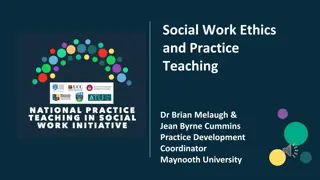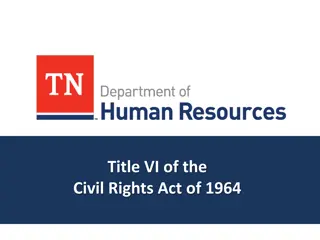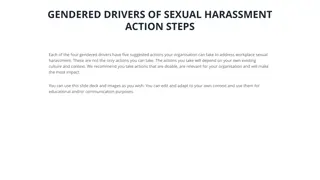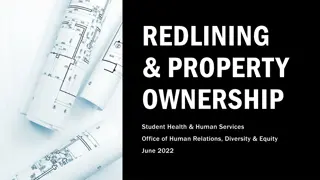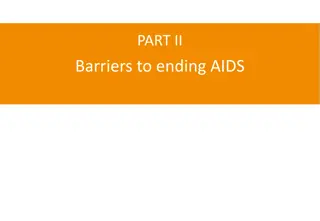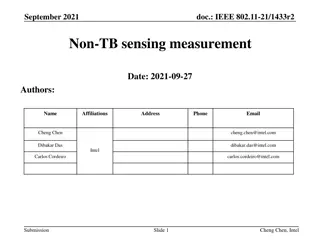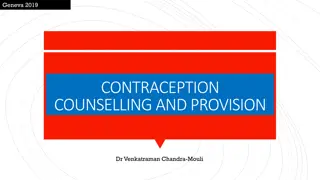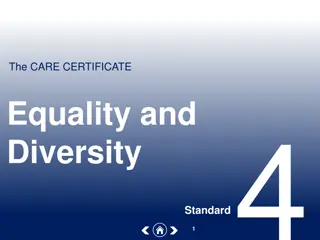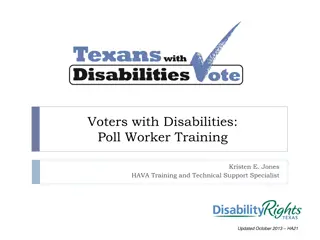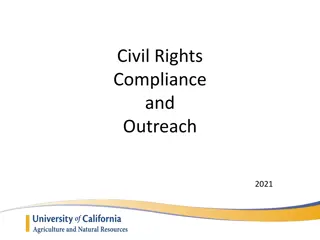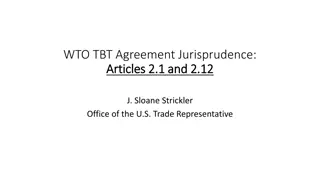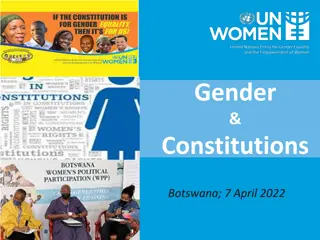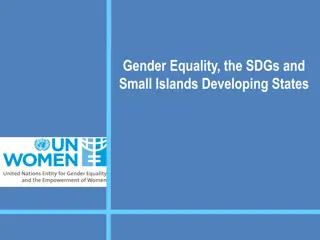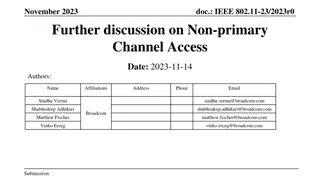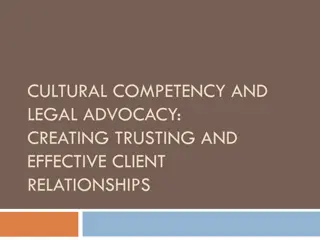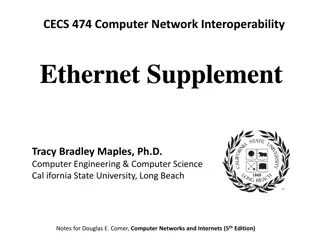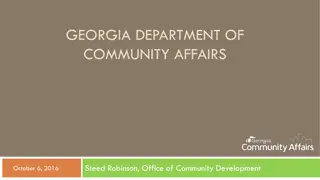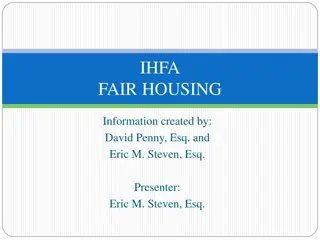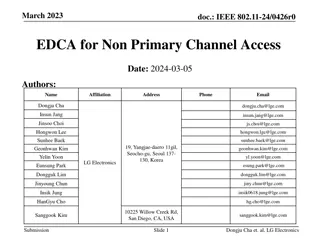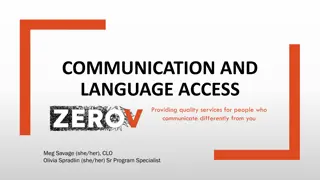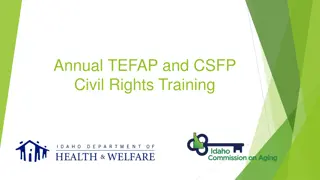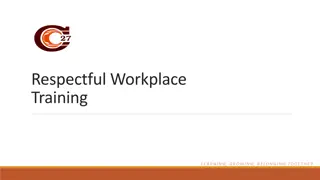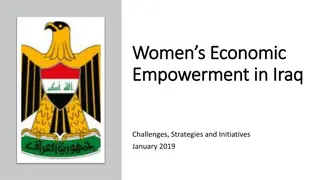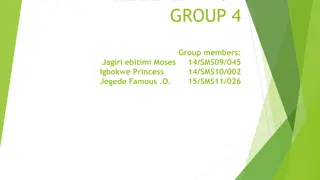Understanding Free Movement of Goods in the European Single Market
The European Single Market ensures the free movement of goods among its member states, prohibiting customs duties and equivalent taxes. The establishment of a customs union and harmonization of regulations play crucial roles. Despite the abolition of customs duties by 1968, further objectives like e
3 views • 16 slides
2022 Thales Access Management Index
Thales Access Management Index highlights the current landscape of access security, revealing insights on multi-factor authentication adoption, remote and privileged user access management, VPN usage trends, challenges faced, and preferences towards third-party access management. The report emphasiz
2 views • 9 slides
CEPT Workshop on 6G Mobile Communications: Numbering & Network Issues
CEPT Workshop on 6G Mobile Communications, led by Elizabeth Greenberg of Ofcom UK, addresses the role of numbering and networks in the ECC, numbering considerations for 6G, and how WG NaN contributes to the development of numbering for 6G technologies. Key topics include ensuring non-discriminatory
1 views • 8 slides
Importance of Ethics in Social Work Practice Teaching
Social work ethics play a crucial role in the placement of students, ensuring they understand and adhere to ethical standards. This includes maintaining confidentiality, practicing non-discriminatory and culturally sensitive methods, setting professional boundaries, and supporting social justice and
1 views • 19 slides
Personnel Safety Systems and Access Control at CERN Facilities
Personnel Safety Systems at CERN include ODH detection, fire safety measures, and access control to protect personnel from hazards. Various access control layers are implemented to regulate entry to different parts of the facility, ensuring only trained personnel access underground areas. Biometric
0 views • 19 slides
Understanding Title VI of the Civil Rights Act
Title VI of the Civil Rights Act of 1964 prohibits discrimination on the basis of race, color, or national origin in programs receiving federal financial assistance. This act outlines the obligations of state agencies and recipients of federal funds to ensure equality and non-discrimination. The tra
1 views • 50 slides
Understanding Non-Aqueous Solvents: Types and Classification
Inorganic non-aqueous solvents play a crucial role in chemical research and industry. This article by Dr. Princy K.G. delves into the classification of solvents based on protonicity, polarity, and aqueous vs. non-aqueous nature. It explores the types of non-aqueous solvents, such as protonic and non
1 views • 29 slides
Parenting on the Move Program: Empowering Parents in Migration & Refugee Situations
The Parenting on the Move Program aims to empower parents of children up to 12 years old in migration and refugee situations. Developed by CIP-Center for Interactive Pedagogy with support from Save the Children, the program provides comprehensive support focusing on family wellbeing, resilience, and
0 views • 39 slides
Addressing Workplace Sexual Harassment: Action Steps for Gender Equality
Implementing effective strategies to address workplace sexual harassment by challenging attitudes, promoting gender equity in leadership, challenging stereotypes, and providing education and support for all employees. Drivers include recognition and challenge of discriminatory behaviors, setting gen
3 views • 5 slides
Understanding Redlining and Its Impact on Communities
Redlining, a historical practice of denying services or goods based on discriminatory reasons, particularly affects property values and homeownership. This systematic denial led to neighborhoods falling into decline due to lack of access to loans. Discriminatory practices isolated minority communiti
7 views • 13 slides
Challenges in Addressing HIV Stigma and Discrimination
Despite a decline in stigma associated with HIV, discriminatory attitudes persist globally, impacting access to healthcare and social inclusion. Data reveals variances in attitudes towards people living with HIV across different regions and highlights the need to address discrimination within health
0 views • 29 slides
Understanding Non-Firm Quantities in Electricity Markets
Non-Firm Quantities in electricity markets involve units with non-firm access not being compensated for their non-firm capacity not getting accommodated on the system. The concept of Firm Access Quantity plays a key role in determining compensation levels for units, with differences in implementatio
0 views • 6 slides
Promoting Democracy and Rights through Education in South Africa
This presentation by UF4SGBs to the Parliamentary Portfolio Committee on Basic Education discusses the key concepts of democracy and rights in education, emphasizing equal access and eliminating discriminatory practices in South Africa. It outlines the country's commitment to equity and redress in e
0 views • 14 slides
Understanding Non-Compete Agreements: Enforceability and Requirements
Non-compete agreements are commonly used in the United States to protect businesses from competition by former employees. To be enforceable, these agreements must meet certain requirements, including independent consideration, protection of legitimate business interests, and reasonableness in scope,
0 views • 26 slides
Comparison of Trigger-based vs. Non-Trigger-based Sensing Measurement in IEEE 802.11
The document discusses the differences between Trigger-based (TB) and Non-Trigger-based (Non-TB) sensing measurement instances in IEEE 802.11 standards, focusing on who initiates the sensing measurement. TB sensing is initiated by the AP, while Non-TB sensing is initiated by a non-AP STA, enabling o
6 views • 13 slides
Addressing Early Pregnancies Among Adolescents Through Contraceptive Education
Contraception plays a critical role in preventing early pregnancies among adolescents, reducing maternal and newborn mortality, and promoting overall well-being. Effective promotion of contraceptive use hinges on knowledge, access to services, and removing barriers. States are mandated to uphold hum
0 views • 10 slides
A Brief History of Apartheid in South Africa
The Dutch established a trading station at the Cape of Good Hope in 1652, leading to the settlement of various European groups, who came to be known as Afrikaners. During the Apartheid era, racial tensions grew, leading to discriminatory laws that enforced segregation and denied basic rights to Blac
0 views • 28 slides
Promoting Integration Through Public Discourse: International Conference Insights
Public discourse plays a crucial role in shaping societal perceptions of diversity and integration. The Integration Foundation International Conference delved into communicative practices that both promote and hinder integration, emphasizing the responsibility of public communicators in constructing
6 views • 15 slides
Promoting Equality, Diversity, and Inclusion in Care Settings
Understanding the importance of equality and inclusion, working inclusively, and accessing information on diversity are crucial aspects of providing fair care. Promoting equality ensures individuals are not discriminated against, and addressing discrimination through person-centered care, non-judgme
0 views • 8 slides
Detailed Guidance and Requirements for Implementing NSPM-33
The update provides detailed guidance on implementing NSPM-33's disclosure requirements and other provisions discussed in the January 2022 CLASP Meeting. It includes areas such as disclosure requirements, digital persistent identifiers, consequences for violations, information sharing, and research
1 views • 19 slides
Understanding Voter Accessibility for People with Disabilities
This training guide covers essential information for poll workers to assist voters with disabilities effectively. It includes disability etiquette, important facts, general guidelines, person-first language, and voter assistance details. Voters with disabilities have rights under HAVA and ADA, ensur
0 views • 12 slides
Understanding Good Cause Eviction in the Section 42 Program
The Section 42 program balances tenant protections with the need to address lease non-compliance through the good cause eviction rule. This rule specifies valid reasons for eviction, emphasizes the importance of state and local laws, and outlines best practices for property managers to follow. It pr
0 views • 9 slides
Understanding Civil Rights Compliance and Outreach in 2021
Explore the essential aspects of civil rights compliance, including laws, discrimination prevention, and protected classes. Learn why data collection on race, ethnicity, and gender is crucial, and delve into the key regulations such as Title VI of the Civil Rights Act of 1964. Understand the benefit
0 views • 24 slides
WTO TBT Agreement Jurisprudence: Understanding Article 2.1 and 2.12
The WTO TBT Agreement's Articles 2.1 and 2.12 focus on ensuring non-discriminatory treatment for imported products compared to domestic and other countries' products. Article 2.1 emphasizes the concept of "like products" and examines competitive relationships between them to determine if they receiv
0 views • 22 slides
Gender and Constitutions: Key Insights and Policy Implications
Constitutions play a pivotal role in shaping systems of governance and accountability, presenting opportunities as well as challenges for advancing gender equality. A shift towards gender-specific language in constitutional content has been observed globally since the 1980s. Examples from countries
0 views • 22 slides
Gender Equality, SDGs, and Small Islands Developing States: Targets and Implementation
Goal 5 of the SDGs focuses on transformative change for gender equality, with key targets addressing discrimination, violence, unpaid care work, and participation in decision-making. Additionally, gender-sensitive targets are integrated into other SDG goals, recognizing the gender dimension in areas
0 views • 10 slides
Further Discussion on Non-primary Channel Access in IEEE 802.11
This contribution delves into the utilization of non-primary channels for access in IEEE 802.11 networks, focusing on enhancing frequency reuse, adhering to ETSI standards, evaluating CCA capability types, and analyzing non-ideal deployment scenarios. It discusses the complexity and benefits of non-
0 views • 26 slides
Open Access at Charles University: Opportunities and Challenges
Charles University is navigating the landscape of open access following the implementation of the Czech National Open Access Strategy. The university is working towards making all research articles and proceeding papers open access, monitoring article processing charges, and promoting open access as
0 views • 24 slides
Cultural Competency and Legal Advocacy: Building Trusting Client Relationships
Understanding cultural competency is essential in legal advocacy to provide effective and trusting client relationships. Cultural competence involves equal access and non-discriminatory practices, enabling communication and intervention for clients from diverse backgrounds. The importance of cultura
0 views • 18 slides
Fair Housing Laws for Real Estate Professionals
Understanding and complying with fair housing laws is crucial for real estate professionals to ensure non-discriminatory practices. This presentation covers the protected classes, importance of compliance, and limitations on who must adhere to fair housing laws.
0 views • 22 slides
Understanding Ethernet and Multiple Access Protocols in Computer Networks
Exploring the fundamentals of Ethernet and multiple access protocols in computer networks, this content discusses the two primary categories of multiple access protocols - contention access and controlled access. It delves into topics such as CSMA/CD, LANs, performance of multiple access schemes, ad
0 views • 7 slides
Ensuring Fair Housing: Laws, Enforcement, and Protected Classes in Georgia
Fair housing laws aim to provide equal opportunity and non-discriminatory treatment to individuals within protected classes in Georgia. The state enforces substantially similar laws to federal statutes, recognizing seven protected classes. Discriminatory conduct triggers such as overt discrimination
0 views • 31 slides
Fair Housing Compliance Overview
Fair Housing laws prohibit housing discrimination based on protected classes. Noncompliance can lead to denial of civil rights and financial consequences. Discriminatory actions include refusal to rent or sell, applying different standards, and making discriminatory statements. Persons with disabili
0 views • 56 slides
Enhanced Distributed Channel Access (EDCA) for Non-Primary Channel in IEEE 802.11
Discussion on implementing EDCA for Non-Primary Channel Access (NPCA) in IEEE 802.11, focusing on mitigating frame collisions and enhancing medium efficiency. Various considerations for EDCA procedure on the Non-Primary Channel (NPCH) are explored to optimize channel access and reduce wastage. Topic
0 views • 13 slides
Enhancing Language Access for Inclusive Services
Explore the importance of language access in providing quality services for individuals who communicate differently. Learn best practices, responsibilities, and tools to offer advocacy through interpretation and translation services. Understand discriminatory practices to ensure equitable services f
0 views • 30 slides
Understanding Civil Rights Training for TEFAP and CSFP Programs
Annual Civil Rights Training for TEFAP and CSFP programs ensures non-discriminatory access to benefits. The training covers legal requirements, discrimination issues, protected classes, and procedures for resolving conflicts and complaints, aiming for equal treatment, elimination of barriers, and st
0 views • 34 slides
Understanding Workplace Harassment and Bullying Training
In this workplace training session, participants will learn about bullying, harassment, and discriminatory behavior in the workplace. The session covers the definition of bullying and harassment, the laws and policies in place, respective roles and responsibilities, reporting procedures, and example
0 views • 18 slides
Understanding Racism's Impact on Health and Society
Racism plays a significant role in the health disparities experienced by racial minorities in the US, leading to higher mortality rates, increased disease severity, and reduced access to quality healthcare. This systematic organization of social groups based on race perpetuates negative attitudes, b
0 views • 14 slides
Challenges and Initiatives for Women's Economic Empowerment in Iraq
Women's economic empowerment in Iraq faces various challenges including limited engagement in non-agricultural projects, late entry and early dropout from the labor market, confined to low-paid jobs, and legislative, social, and financial obstacles. Initiatives are needed to address these issues, su
0 views • 18 slides
Gender Equality in Post-Conflict Societies: Challenges and Opportunities
Discrimination against women and girls can persist or worsen post-conflict, affecting their access to resources and participation in reconstruction processes. Sustainable peace requires women's involvement and gender perspectives integration. Political, economic, and social reconstruction must prior
0 views • 15 slides



